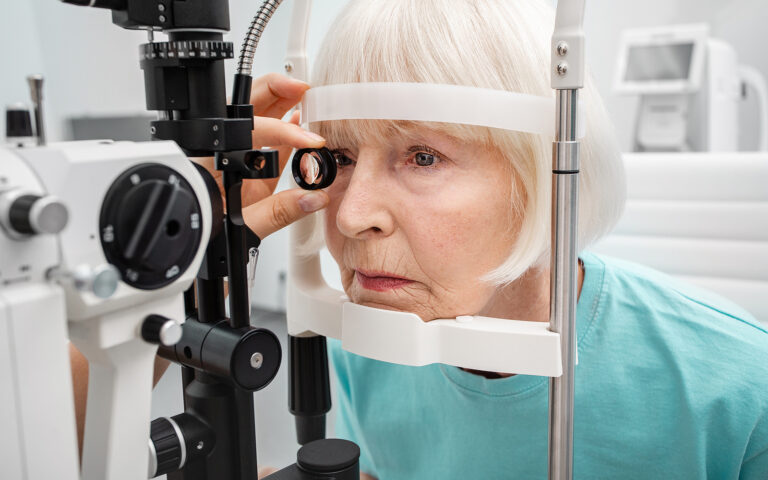While it is well known that diabetes can cause complications like cardiovascular disease or kidney damage, the relationship between diabetes and the eyes isn’t talked about as often. But it’s important to be aware that diabetes can put patients at an increased risk for developing dangerous eye conditions, collectively known as diabetic eye disease. Regular diabetic eye exams can help preserve and protect your vision by allowing eye doctors to diagnose and treat these conditions early on.
Understanding Diabetic Eye Disease
There are many kinds of diabetic eye disease, including diabetic retinopathy, diabetic macular edema, glaucoma and cataracts. Studies show that cataracts are three to four times more prevalent in patients with diabetes even before the age of 65, and that risk grows with age. One in 15 people with diabetes will develop diabetic macular edema.
Diabetic retinopathy is caused by damage to the blood vessels in the retina, which is a thin layer of tissue at the back of your eye. The retina is a vital part of your vision. When blood sugar is too high, it blocks the blood vessels leading to the retina until they rupture. Left untreated, diabetic retinopathy can result in vision loss and even blindness.
Symptoms of diabetic retinopathy, like blurred vision or difficulty perceiving colors, usually don’t occur until later stages of the disease. That’s why it’s important to schedule regular dilated eye exams, where ruptured vessels can be detected before they cause bleeding, scarring or vision loss.
What to Expect From a Diabetic Eye Exam
Florida Eye Specialists provides comprehensive diabetic eye exams to screen for damage before diabetic eye disease affects your sight. During these exams, your eye doctor will dilate your eyes to widen the pupil, allowing them a clear view of your eyes and any signs of trouble.
If your provider suspects you have diabetic retinopathy or macular edema, they may perform a screening to get a closer picture of the blood vessels in your retina. A diabetic eye exam is simple and painless, and only takes a few minutes more than a routine vision check.
How to Prevent and Treat Diabetic Eye Disease
Preventing diabetic eye disease starts with managing your diabetes by taking prescribed medications, staying active and practicing good eating habits. Even if your blood sugar is controlled, it’s important to have a dilated eye exam at least once a year. Conditions like diabetic retinopathy often don’t have symptoms at first. If your doctor can detect damage early during an exam, they can begin treatment before your vision declines.
If you are looking for diabetic retinopathy treatment in Jacksonville, FL, Florida Eye Specialists is home to a team of experts in retinal diseases. Dr. McGregor N. Lott is a board-certified, award-winning ophthalmologist with 15 years of experience in treating conditions of the retina. Treatments range from medications to laser treatment and surgery. You’ll work closely with the team at Florida Eye Specialists’ Retinal Center to create the best care plan for you.
Diabetic eye disease can become serious. It’s important to work with your local Jacksonville eye specialists to monitor for changes in your eyes, so you can receive treatment early and prevent vision loss. Schedule a diabetic eye exam with Dr. Lott and the medical retina experts at Florida Eye Specialists.
About Florida Eye Specialists
Florida Eye Specialists is one of the largest multi-specialty ophthalmology private practices in Northeast Florida, with offices in Fernandina Beach, Gate Parkway/295, Mandarin, Northside, Ponte Vedra Beach, Riverside, San Marco, Southpoint, Orange Park, and St. Augustine.
Florida Eye Specialists is a comprehensive eye care practice that features a complete spectrum of ophthalmology services. Our surgical services include cataract surgery, LASIK eye surgery, corneal procedures, glaucoma treatment options, oculoplastic eyelid surgery, dry eye treatment, and even cosmetic and skin care services. Schedule an appointment at one of our ten locations.

